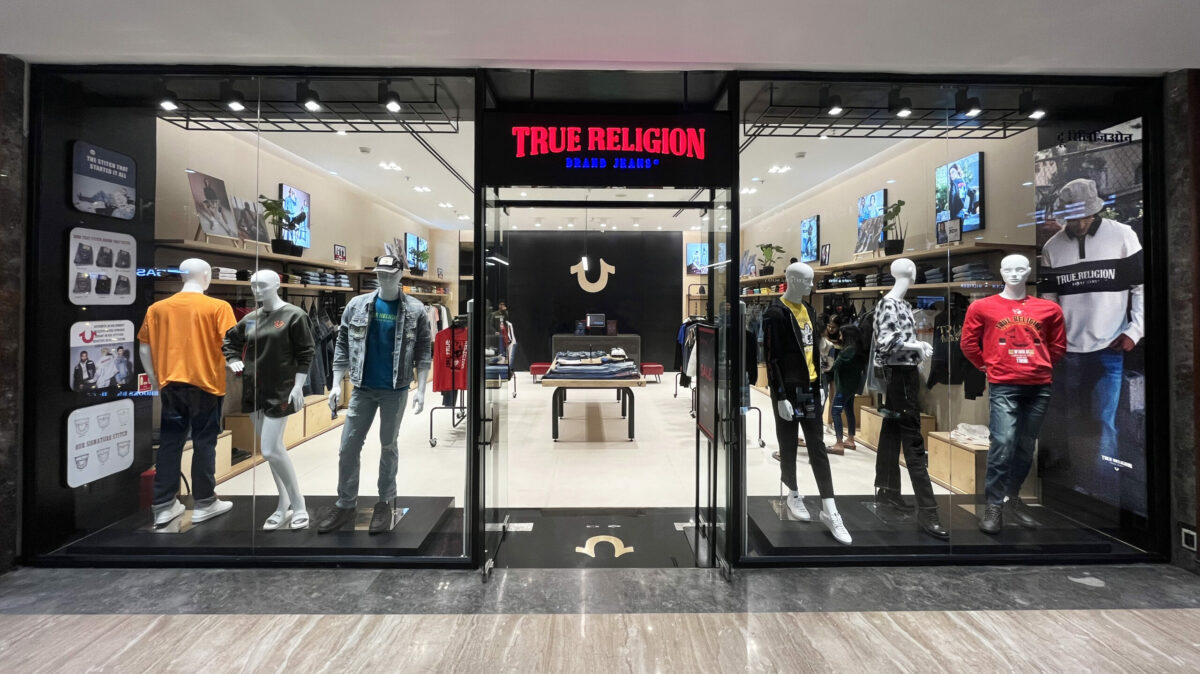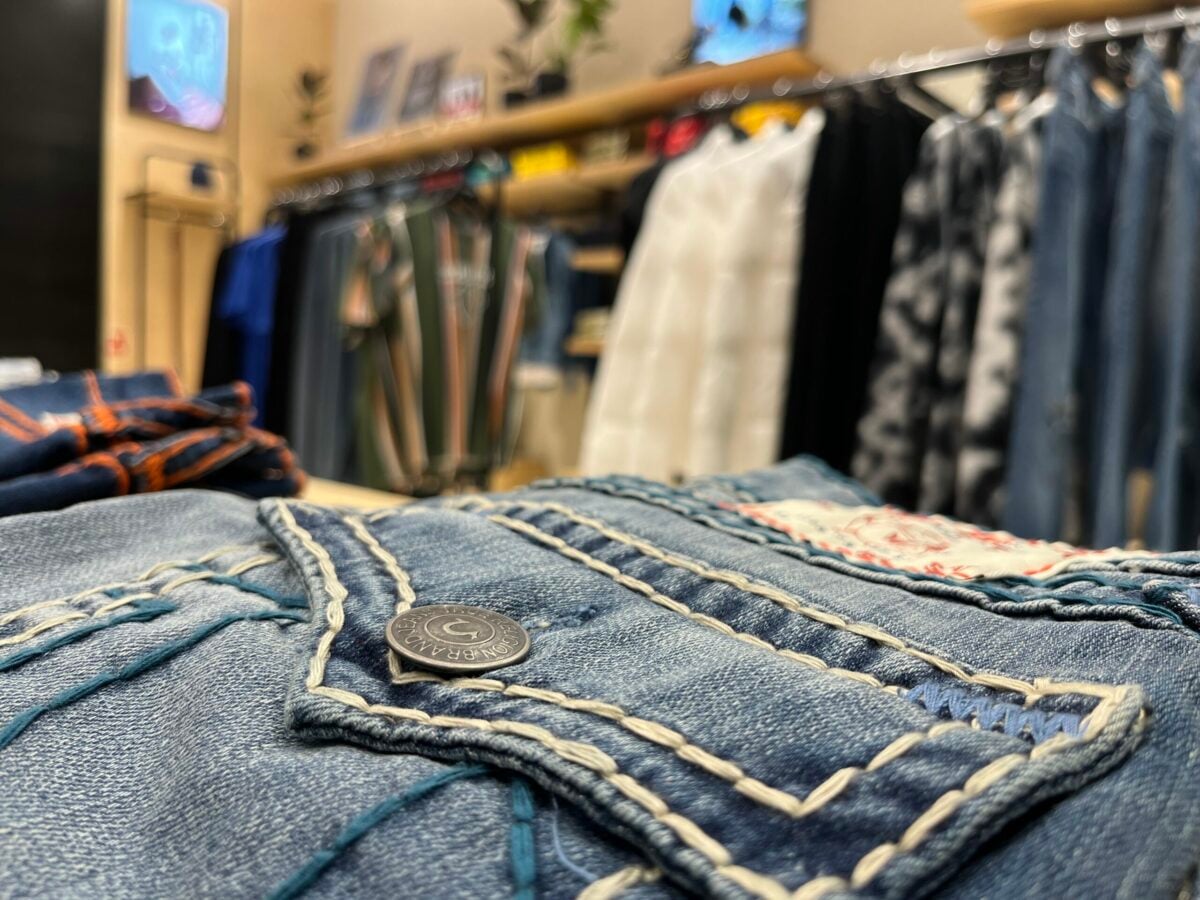Three years after bouncing back from bankruptcy, True Religion Apparel Inc. is continuing its upward trajectory. The Gardena-based denim and apparel maker is now expanding its global footprint to China, with a mix of 65 freestanding stores and shop-in-shops set to open by 2026, for a total of 108 in the region in the next five years.
True Religion’s intermediary in China is Aurorae Group, which also serves as an exclusive distributor to Globetrotter and Off-White brands and owns premium denim label Evisu.

“We felt that Aurorae Group and Evisu are the best partners for us in the region because they have incredible experience in the Chinese market and bring an unparalleled wealth of knowledge about the local customer,” said Michael Buckley, True Religion’s chief executive. “We each have a lot of admiration for the other, and the timing was right for both of us.”
Highs and lows
True Religion has 50 stores and about 600 employees worldwide. Jeff Lubell and his then-wife Kym Gold founded the brand in 2002, and began operating under the Guru Denim Inc. moniker. The company went public the following year, through a reverse merger with Gusana Explorations Inc. It generated about $2.3 million in sales and changed its name to True Religion. Lubell became the president and chief executive and opened company’s first store in 2005 in Manhattan Beach.

By 2012, True Religion was generating $467 million in annual revenue and had some 3,000 employees, according to Securities and Exchange Commission filings. Its denim products — known for the iconic horseshoe and Buddha logos — were priced in the $200-$300 range, catering to consumers in the $200,000-plus household income demographic.
Lubell’s tenure ended in 2013, when TowerBrook Capital Partners acquired the brand for $824 million, taking it private.
When consumer sentiments and shopping patterns began to change toward athleisure apparel and ecommerce, the brand struggled to keep up. It filed for Chapter 11 bankruptcy in 2017, pointing to a “macro consumer shift away from brick-and-mortar to online retail channels,” according to the court documents. The move allowed the company to reduce its term loans from $471 million to $114 million and extend its debt maturities to 2022.
Restitching
Buckley, who served as president of True Religion from 2006 to 2010, rejoined the brand in 2019. He focused on repositioning it to appeal to a broader consumer sector, a strategy that also called for moving sourcing of merchandise to outside the United States to meet the lower profit margins.
“One of the most significant components to our repositioning strategy was understanding and addressing True Religion’s new, diverse customer base,” Buckley said. “The current True Religion customer is a loyal, very diverse group of men and women spanning a broad age range of 15 to 50, with an average household income of $65,000, who want jeans, T-shirts, hoodies and branded accessories at an affordable price. We reengineered True Religion’s supply chain to reduce manufacturing costs in order to drive gross margins and profitability.”
Then, in April 2020, True Religion filed for Chapter 11 bankruptcy again, citing “existing liquidity constraints, accelerated by the Covid-19 pandemic and the attendant government stay-at-home orders.”

But Buckley held the course steady. Last year the company marked its 20th anniversary with roughly $250 million revenue, and he anticipates sales will reach $280 million by the end of 2023.
“Our goal is to achieve $450 to $500 million in sales by 2026,” Buckley said. “The primary driver of this growth will be e-commerce, followed by U.S. wholesale, and then our own stores. We plan to do $125 million in sales online this year and will continue growing e-commerce to become 50% of our total business.”
He added that the brand has undergone “an incredible transformation towards a digital-first direct-to-consumer business,” and has recently announced several “major business initiatives.” They include a new loyalty program, True Fam, which debuted last month and allows members to earn and redeem points in-store, online, and through the brand’s recently launched mobile app.
“Loyal customers spend 67% more on average than new ones, and the ability to earn rewards influences about two-thirds of consumers’ behavior,” Scott McCabe, senior vice president of digital, said in a statement. “Furthermore, our most valuable customers aren’t just the ones who spend the most money. True Fam allows us to prioritize shoppers who refer True Religion to their friends and family while also tailoring their experiences based on purchase history and tier status.”
Ecommerce increase
While True Religion’s own direct-to-consumer ecommerce business will continue to focus on North America, the brand’s enthusiasts in China, Hong Kong and Macau can shop via online retailers with presence in the region, including Tmall.com, JD.com, Douyin.com, and Dewu.com.
Aurorae Group, serving as its exclusive distributor, will have the right to sell the full range of True Religion’s product assortment, including core denim, heritage products, and collaboration collections, according to the company. The group will also develop product across men’s, women’s, kids apparel and accessories specifically designed for the Chinese market.
“We are enthusiastic about this partnership,” Evisu’s Chief Executive David Pun said in a statement. “We are looking forward to introducing True Religion to a new wave of Chinese consumers and leveraging our comprehensive relationships and extensive retail networks in Asia to bring the brand to unprecedented new heights.”
